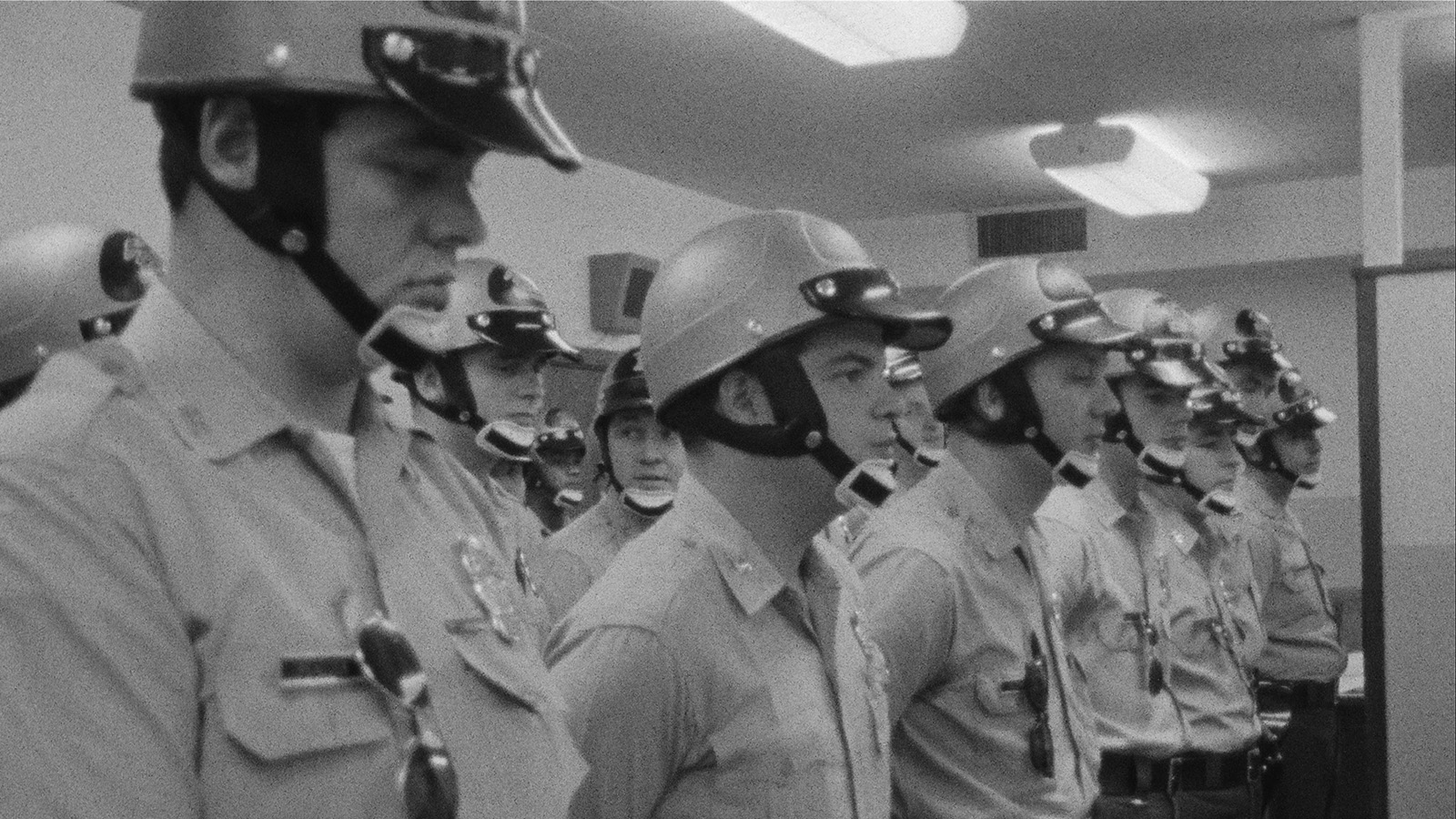This article appeared in the June 7, 2024 edition of The Film Comment Letter, our free weekly newsletter featuring original film criticism and writing. Sign up for the Letter here.

Law and Order (Frederick Wiseman, 1969)
Twenty minutes into a press screening of Quentin Dupieux’s The Second Act, the Opening Night selection of this year’s Cannes Film Festival, I nearly walked out of the Bazin Theatre. I found the film’s long inaugural set piece, in which two men (Louis Garrel and Raphaël Quenard) argue about whether it’s acceptable to express lewd skepticism about trans people, to be cheap and lazy—but the audience guffawing deliriously around me was even more off-putting. At the urging of a colleague, I stuck it out, and I’m glad I did—not because the film (or the audience) improved, but because, true to its name, The Second Act revealed its matryoshka-doll shtick only about halfway in: it turns out that what we’re watching is the filming of a movie written by A.I. about the making of a movie. The punch line? It’s not punching down if you blame it on A.I.!
Anxieties about artificial intelligence and surveillance pulsed through this edition of the festival. This year’s mistress of ceremonies, Camille Cottin, opened the proceedings with a speech that exalted Cannes as a bastion of humanity in a world where, among other crises, “our collective intelligence is threatened with becoming artificial.” One of the best films in the Competition, David Cronenberg’s eerily romantic The Shrouds, traces spirals of reality-shifting conspiracies around a futuristic grave technology that allows you to watch your loved ones decompose, with a key plot turn that hinges on a hacked A.I. avatar. Among the various garish technophobic spectacles in Francis Ford Coppola’s Megalopolis is a deepfake video, which rhymed creepily with headlines about OpenAI’s purported brazen recreation of Scarlett Johansson’s voice.
Meanwhile, likely unbeknownst to most of them, the nearly 40,000 attendees who descended upon the seaside resort town of Cannes to attend the festival were test subjects for a new algorithmic video-surveillance system being piloted in advance of the 2024 Summer Olympics in Paris. The use of A.I.-powered cameras was made possible by changes to the country’s surveillance laws that were adopted last year despite many protests from human-rights organizations, including a letter from 38 civil-society groups warning that the new policies would “pose unacceptable risks to fundamental rights, such as the right to privacy, the freedom of assembly and association, and the right to non-discrimination.” The surveillance system is not allowed to use facial recognition, though a report last year revealed that French police had been using Briefcam, a facial analysis tool, illegally on the public for years. Briefcam uses a technology designed in Israel, which for months has been using A.I. to drop bombs on Gaza.
***
For years, fears of terrorist attacks and shootings have led to an intense theater of security at Cannes, with hundreds of CCTV cameras, armed riot police, imperious security guards, and layers of bag- and body-scanners deployed during the festival. This year, according to Le Monde, in addition to the 200 officers and 66 surveillance agents already in Cannes and 400 security guards around the Palais des Festivals, Paris authorities sent 400 more security personnel to the city. The security guards carefully policed the red carpet, with several attendees confiding to me that they were asked to remove keffiyehs and pins showing solidarity with Le collectif des précaires des festivals de cinéma (The Precarious Film Festival Workers Collective), a group that has been demanding better pay and access to France’s social-security benefits for seasonal entertainment workers. Armed officers quashed the attempts at the opening ceremony by a couple dozen members of the Collective to unfurl their banner on top of the ginormous Cannes billboard over the Grand Théâtre Lumière. And some cops allegedly attacked a British-Nigerian woman, who claimed on social media that after local bar-staff at Cannes physically assaulted her on May 19, municipal police arrived and violently pinned her down, treating her like “a criminal rather than a victim,” and exacerbating injuries that required medical attention.
Videos from both incidents bore discomfiting resemblances to some of the images I saw inside the cinemas at Cannes—particularly in Frederick Wiseman’s Law and Order (1969) and Mohammad Rasoulof’s Competition entry The Seed of the Sacred Fig, with its real-life videos of terrifying police brutality in Iran. Introducing Law and Order, which screened in a pristine new restoration in the Cannes Classics section, the 94-year-old Wiseman recalled that he had, in those heydays of the American Civil Rights struggle, jumped at the opportunity to make a film that would show that cops are “pigs”—but had also encountered, in the 400 hours he spent shooting the day-to-day operations of the Kansas City Police Department in Missouri, the “piggery of the people” that the police have to deal with. True to Wiseman’s style, the film is patient and curious, more interested in process than answers. In bright, black-and-white 16mm, we witness the gamut of the local cops’ work, from helping weeping children to catching car thieves.
Indeed, there are many scenes of gentleness on screen, yet what lingers in my mind are the glimpses of brutal violence the mostly white cops mete out to mostly Black subjects—and not just for the sheer force used by the police, but also for their air of impunity even in the face of Wiseman’s camera. In a notorious sequence, a young, Black sex worker is dragged out of a hotel by a plainclothes cop and held in such a powerful choke hold that her tongue dangles out of her mouth; she can only grunt pleadingly to be let go. In showing us the whole range of ways in which individuals may inhabit an institution, Wiseman draws our attention to how the former may become alibis for the latter: how discrete acts of kindness, and the conviction of being a good samaritan, can fuel the blistering righteousness with which with the police are accorded undue power over fellow citizens. People can indeed be pigs to each other—but why should some have the sanctioned authority to do so?
Un Certain Regard standout Santosh, the first fiction feature by Indian-British documentarian Sandhya Suri, made for a brilliant companion piece to Law and Order. We first meet Santosh (Shahana Goswami) in the film’s hushed opening as her husband, a constable, has just been killed in a riot. She has been ostracized by her community, so when she is offered her late spouse’s job as part of an Indian state program to support widows of policemen, she sees a pathway toward independence: a salary, and even a room of her own. Santosh sets us up to root for our heroine and her feminist awakening—only to expose it all as an acrid smoke screen when Santosh is tasked with investigating the rape and murder of a lower-caste girl, allegedly by a Muslim man, under a female cop whose girlboss chutzpah conceals terrible abuses of power.
Suri structures the film like a psychological thriller. The motives of individual characters remain ambivalent, shaded in moral chiaroscuro, but they are also ultimately beside the point: being within the institution means being convinced of the need to instill fear and wield violence. In one scene, Santosh and her colleagues bully and threaten a young man with harassment charges for hanging out with his girlfriend in a park. He grabs Santosh by the hand pleadingly, and when she opens her palm she finds he has stuffed it with a small wad of cash. Santosh’s face sharpens slowly from confusion to glinting satisfaction (I can get away with this?): a portrait of power corrupting in real time.
***
Cognitive dissonance is an axiom of the moviegoing experience. The power of cinema—lifelike fictions given bounded, unlifelike shape—lies in its utopian promises. It can allow us to experience worlds not yet within our grasp. That disparity, between dream and reality, can either fill us with yearning and propel us toward action; or it can sate us vicariously, becoming an excuse not to take action. Major film festivals are, by design, invested in ensuring the latter. An entire ecosystem—involving labor, capital, politics, technology—comes into being to allow us to watch, buy, and sell films. Any change in the status quo would destabilize this ecosystem. So we submit to the myth of the festival as a hermetically sealed world. We tsk-tsk at Cannes’s annual ban on protests along the Croisette and continue to book tickets for screenings. We write glowing reviews of films that critique the very institutions that our presence at Cannes is used to justify.
But that implicit surrender to dissonance has been growing increasingly unsustainable in the last eight months, as artists and festival workers have been organizing in support of a ceasefire in Gaza and demanding greater agency within film institutions. They have used their work, platforms, and presence to ask that festivals reconcile their (increasingly, fashionably progressive) artistic positions with their material and political engagements. To some, this insistence may seem futile or misplaced. Certainly it does to Cannes Artistic Director Thierry Frémaux, who, in the pre-fest press conference, swore off controversies and polemics at this year’s edition: “In Cannes, the politics should be on the screen.” According to The Hollywood Reporter, he also questioned the political influence of film festivals. “When we gave the Palme d’Or to Michael Moore for Fahrenheit 9/11 did it have an impact on the reelection of George [W.] Bush? No.” But politics is not a grand, faraway thing, implying only election outcomes and geopolitical upheavals. Festivals are, fundamentally, exercises in world-building. Like students on campuses across the globe, activists in the film-festival space are asking: what kind of world are we building right here, right now? What possibilities are we reifying through our participation in a film festival, and which ones are we foreclosing?
Two of the most beautiful movies I saw this year at Cannes refocus politics as the product of small acts of instantiation. Tru’o’ng Minh Quý’s Viet and Nam and Payal Kapadia’s All We Imagine as Light are shiveringly pretty films in which illicit love stories unfold against fraught backdrops. In the former, two gay coal miners contending with the ghosts of the Vietnam War prepare for a treacherous emigration in search of better fates; in the latter, a Hindu nurse secretly romances a Muslim man in a Mumbai where the threat of communal violence lingers perpetually in the shadows. Both films shudder under weighty historical and political burdens, yet seek resolution and subversion in intimate human gestures—of acceptance, desire, and beauty, brandished in the face of terror. Both films also implicate capital-P politics: Viet and Nam has been banned in Vietnam for its “negative” portrayal of the country, while All We Imagine as Light, which made history as the first Indian Grand Prix–winner, has earned bouquets from the same public officials who have persecuted Kapadia for participating in strikes against the right-wing government’s interference in India’s premier public film school.
Celebrating such films and the communities they convene is one of the possibilities that international festivals keep alive. But how long can we maintain the ruse of championing artistic freedom and civil liberties in cinemas surrounded by hundreds of cops and A.I.-powered cameras and staffed by underpaid workers? There is no easy way out of these imploding contradictions—no zoom-out to break the fourth wall and relieve the tension; no artificial intelligence–themed twist to blame it all on. We have wrought this world, and we will have to rebuild it.
Devika Girish is the Editor of Film Comment and a Talks programmer for the New York Film Festival.




